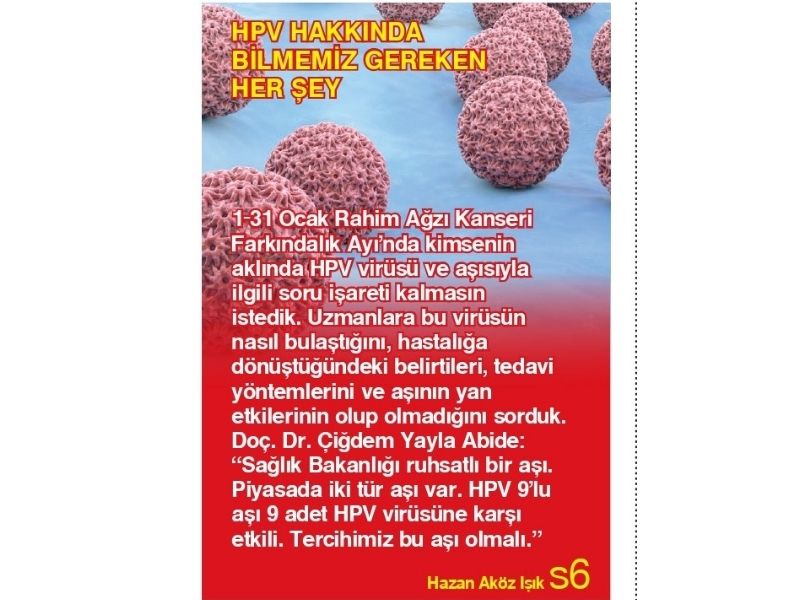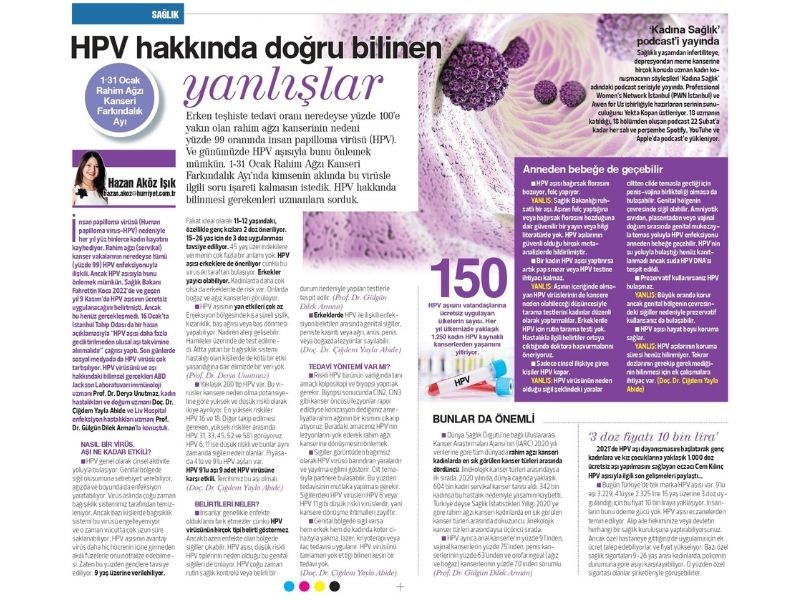Cervical cancer, which has a cure rate of almost 100 per cent in early diagnosis, is 99 per cent caused by human papillomavirus (HPV). And today it is possible to prevent it with the HPV vaccine. On 1-31 January Cervical Cancer Awareness Month, we wanted no one to have any questions about this virus. We asked the experts what to know about HPV.
Hundreds of thousands of women die every year due to human papilloma virus (HPV). Almost all (99 per cent) of cervical cancer cases are related to HPV infection. However, it is possible to prevent this with the HPV vaccine. Minister of Health Fahrettin Koca stated that the HPV vaccine would be administered free of charge in 2022 and on 9 November last year. However, this has not yet been realised. On 16 January, the Istanbul Chamber of Medicine made a press statement calling for ‘HPV vaccine should be included in the national vaccination calendar without further delay’. In recent days, the HPV virus has been discussed a lot on social media. We talked about the HPV virus and scientific facts about the vaccine with Prof. Dr. Derya Unutmaz, immunology specialist at the US Jackson Laboratory, Assoc. Dr. Çiğdem Yayla Abide, gynaecologist and obstetrician, and Prof. Dr. Gülgün Dilek Arman, infectious diseases specialist at Liv Hospital.


WHAT KIND OF VIRUS IS IT AND HOW EFFECTIVE IS THE VACCINE?
HPV is generally transmitted through sexual activity. It can cause warts in the genital area and can also cause infection in the mouth and neck. The virus is actually cleared by our immune system most of the time. However, in some people, the immune system cannot prevent this virus and then it can be stored in the body for a very long time. The advantage of the HPV vaccine is that it can neutralise the virus with smart missiles before it ever enters the cell. That is why it is recommended for young people. It can be given over 9 years old. But ideally, 2 doses are recommended for 11-12 years old, especially for young girls. It is also recommended to apply 3 doses for 15-26 years old. Giving to those over 45 does not make much sense. HPV vaccine is also recommended for men because this virus is transmitted from two sides. Men can be spreaders. Although it is more common in women, there is also a risk in men. They have throat and mouth cancers.
The side effects of the HPV vaccine are very few. It may cause short-term swelling, redness, headache or dizziness at the injection site. Rarely, allergies may develop. It has not been tested on pregnant women. We have no data that people with an underlying immune system disease experience a bad effect. (Prof. Dr. Derya Unutmaz)
There are about 200 types of HPV. These viruses are divided into high and low risk according to their potential to cause cancer. We see HPV 31, 33, 45, 52 and 58 among the high-risk ones that need to be followed. HPV 6, 11 are low risk and these are also the ones that cause warts. There are 4 and 9 HPV vaccines on the market.
HPV 9 vaccine is effective against 9 HPV viruses. Our preference should be this vaccine. (Assoc. Dr. Cigdem Yayla Abide)
WHAT ARE THE SYMPTOMS?
◊ People often do not realise they are infected because many types of the HPV virus do not show symptoms. However, sometimes warts can appear on the infected area. The HPV vaccine also prevents these genital warts caused by low-risk HPV types. HPV is often detected by routine health check-ups or tests for a specific condition. (Prof. Dr. Gülgün Dilek Arman)
Symptoms of HPV-related infectionin men include genital warts, itching or pain in the penis, lesions in the anus, penis or throat. (Assoc. Prof. Dr. Cigdem Yayla Abide)
The number of countries that provide HPV vaccine free of charge to their citizens. Approximately 1,250 women die from HPV-induced cancers in our country every year.
IS THERE A TREATMENT METHOD?
In the presence of risky HPV types, colposcopy and biopsy should be performed for diagnostic purposes. If cancer precancerous lesions such as CIN2, CIN3 are reported as a result of biopsy, we remove a part of the cervix with the surgery we call conisation. Our aim here is to destroy the lesions of HPV and prevent it from turning into cervical cancer.
Warts are wounds harbouring HPV virus regardless of their appearance and tend to spread. It can be transmitted to the partner through skin contact. Therefore, treatment is absolutely necessary. HPV viruses in warts are low-risk viruses such as HPV 6 or HPV 11, so they are unlikely to turn into cancer.
If there is a wart in the genital area, cautery, laser, cryotherapy or drug treatment is applied in both men and women. There is no definitive treatment known to completely destroy the HPV virus. (Assoc. Prof. Dr. Cigdem Yayla Abide)
CAN ALSO BE PASSED FROM MOTHER TO BABY
HPV vaccine disrupts the intestinal flora and causes paralysis.
FALSE: It is a vaccine licensed by the Ministry of Health. There is no reliable publication or information in the literature that the vaccine causes paralysis or disrupts the intestinal flora. It has been reported in many meta-analyses that HPV vaccines are safe.
If a woman gets the HPV vaccine, she no longer needs a pap smear or HPV test.
FALSE: Women should have regular screening tests because HPV viruses not included in the vaccine can also cause cancer. There is no routine screening test for HPV in men. We recommend that they consult a doctor when symptoms of the disease appear.
Only people who have sexual intercourse can get HPV.
FALSE: Since wart-shaped sores caused by the HPV virus are transmitted through skin-to-skin contact, they can be transmitted even without penis-vagina intercourse. There may be warts around the genital area. HPV infection can be passed from mother to baby through amniotic fluid, placenta or contact with the genital mucosa during vaginal delivery. HPV has not yet been proven to be transmitted through water, but HPV DNA has been detected in water.
HPV cannot be transmitted if you use a condom.
FALSE: It protects to a large extent, but it can be transmitted even if you use a condom because of the warts around the genital area.
The HPV vaccine provides lifelong protection.
FALSE: The duration of protection of HPV vaccines is not yet known. Additional studies are needed to know whether repeat doses are needed. (Assoc. Prof. Dr. Çiğdem Yayla Abide)
THESE ARE ALSO IMPORTANT
According to 2020 data from the International Agency for Research on Cancer (IARC) of the World Health Organisation, cervical cancer is the fourth most common cancer in women worldwide. It ranks first among gynaecological cancer types. In 2020, approximately 604 thousand women worldwide were diagnosed with cervical cancer. 342 thousand women lost their lives due to this disease. In Turkey, according to the Health Statistics Yearbook 2020, cervical cancer ranks ninth among the most common types of cancer in women. It is the third most common gynaecological cancer.
HPV is also responsible for 91 per cent of anal cancers, 75 per cent of vaginal cancers, 63 per cent of penile cancers and 70 per cent of oropharyngeal (mouth and throat) cancers. (Prof. Dr. Gülgün Dilek Arman)
‘3 DOSES COST 10 THOUSAND LIRAS’
Pharmacist Cem Kılınç, who initiated HPV vaccine solidarity in 2021 and provided approximately 1,000 doses of free vaccine to young women and girls, shared the latest developments regarding the HPV vaccine...
Today, there is only one brand of HPV vaccine in Turkey. The vaccine with 9 doses costs 3,229 liras and 4 doses cost 2,325 liras. Since 3 doses are applied over 15 years of age, this price approaches 10 thousand liras. People cannot afford to pay this. HPV vaccine is available from pharmacies. You can get it from your family doctor or any health institution of the state. However, when you go to a private hospital, they may charge an additional fee for the application and the price rises. Some private health insurances can cover the vaccine for women between the ages of 9-26, depending on the status of the policy. Therefore, those with private insurance can contact their companies.
‘HEALTH FOR WOMEN’ PODCAST ON AIR
From healthy living to infertility, from depression to breast cancer, the interviews of expert female speakers on many topics are now online with the podcast series called ‘Health for Women’. The series, prepared in cooperation with Professional Women's Network Istanbul (PWN Istanbul) and Awen for Us, is hosted by Yekta Kopan. The podcast, consisting of 18 episodes with the participation of 18 experts, is available on Spotify, YouTube and Apple every Tuesday and Thursday until 22 February.







